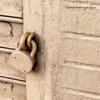 Keith Rowe and Christian Wolff have been playing together since 1968, when Wolff first performed with AMM in the UK. Their history together goes back further, a part of the turbulent musical and political eddies set in motion by the New York School and Cornelius Cardew in the late 1950s and early ‘60s. But this performance, recorded live at NYC’s The Stone as part of Jon Abbey’s AMPLIFY 2011 festival, marks their first recorded appearance as a duo. It’s an inspired pairing. Together they produce quiet, sharp, and surprisingly gorgeous music that exemplifies the still radical ideas they started exploring over 40 years ago.
Keith Rowe and Christian Wolff have been playing together since 1968, when Wolff first performed with AMM in the UK. Their history together goes back further, a part of the turbulent musical and political eddies set in motion by the New York School and Cornelius Cardew in the late 1950s and early ‘60s. But this performance, recorded live at NYC’s The Stone as part of Jon Abbey’s AMPLIFY 2011 festival, marks their first recorded appearance as a duo. It’s an inspired pairing. Together they produce quiet, sharp, and surprisingly gorgeous music that exemplifies the still radical ideas they started exploring over 40 years ago.
The political side of Rowe and Wolff’s music isn’t always apparent, but it’s there, hidden in plain sight. Looking for it can be enlightening, but is unnecessary. The music they make together on ErstLive 010 stands all on its own. It is by turns gossamer thin and concrete, whisper quiet and abrasive, lucid and impenetrable. Keith’s contributions consist of physical noises drawn and scratched into the strings of his table-top guitar, along with live radio broadcasts and the buzz of electrical signals emanating from various electronic devices. Christian's contributions are on the piano and guitar. He hammers on the piano's keys, pulls and mutes the strings, and drums on its body, preferring to play around the piano rather than directly on it—the way pianos are typically played. At the guitar he makes small sounds; plucks a solitary note here, draws a bow across the strings there, and then sits quietly back waiting for the next move.
Both musicians punctuate their performances with these (near) silences. Their pauses break the performance up and keep it from coalescing, which means all the focus is on the discrete cells of sound they produce. Ideas are ventured and tweaked, and then left behind. Seconds pass and only the tiniest sounds are made. Keith sketches out an idea, and Christian climbs over it with the occasional crescendo. It all sounds very deliberate in retrospect, but as it’s happening, anything seems possible. Wolff the composer and Rowe the improviser make the line between their methods difficult to spot.
The quiet and deliberate pace of the music also calls attention to the performance space. September 4th was a hot night at The Stone, but the air conditioning and fans in the room were turned off while Keith and Christian played. With those noises out of the way, I wonder what other sounds were audible in that room. The recording itself, helped by Joe Panzner’s excellent mastering job, is clear and close to the musicians; many of the tiniest sounds they make are audible, but I’ve yet to catch a noise from the audience, or from outside.
And that strikes me as odd, because each time I have listened to ErstLive 010, some environmental sound has crept covertly into the music: the sound of clothes tumbling in the dryer downstairs, wind and rain pressing against the windows outside, the low hum of traffic in the distance. Even with headphones on, I’ve mistaken sounds coming from the neighbors upstairs for something in the mix. Without Rowe and Wolff physically present to contextualize the music, my neighbors and environment unwittingly participate in it, and I think that must have been true at The Stone that night, too.
After I noticed this the first time, the music transformed for me. It bled into the walls and out into the neighborhood. In his April 1998 interview with Perfect Sound Forever, Christian Wolff remarks that he has "a strong anti-rhetorical feeling – I don’t think that music should be manipulative. It should be there and people should be able to do with it what they can and what they want... So there’s that kind of attitude about a musical work. It should just be itself and relatively free from manipulation and calculation to the extent that it’s possible." ErstLive 010 exemplifies this. At the right volume, in the right circumstances, it can hide in book shelves, seep into the wood floors, and camouflage itself in sounds as small as a breath. Rowe and Wolff’s receptiveness to these tiny sounds, maybe even to subconscious and unintended ones, makes this effect possible. And the more open the music is, the deeper and more remarkable I perceive it to be, and the easier it is for me to spy the political and social ideas that have, at times, influenced their writing and performing.
The album ends unexpectedly, to the tune of humming amplifiers. I failed to notice it ending the first time. And the second. And even the third. In fact, I always fail to notice when the album ends unless I pay attention to the track time. Eventually the performance stops, but the sounds continue. They just happen, the way that many environmental sounds seem to. It’s as if Rowe and Wolff are disappearing into the music as they go, using it to get past or away from themselves. By the end, it’s as if they're not there at all.
samples:
 
Read More

